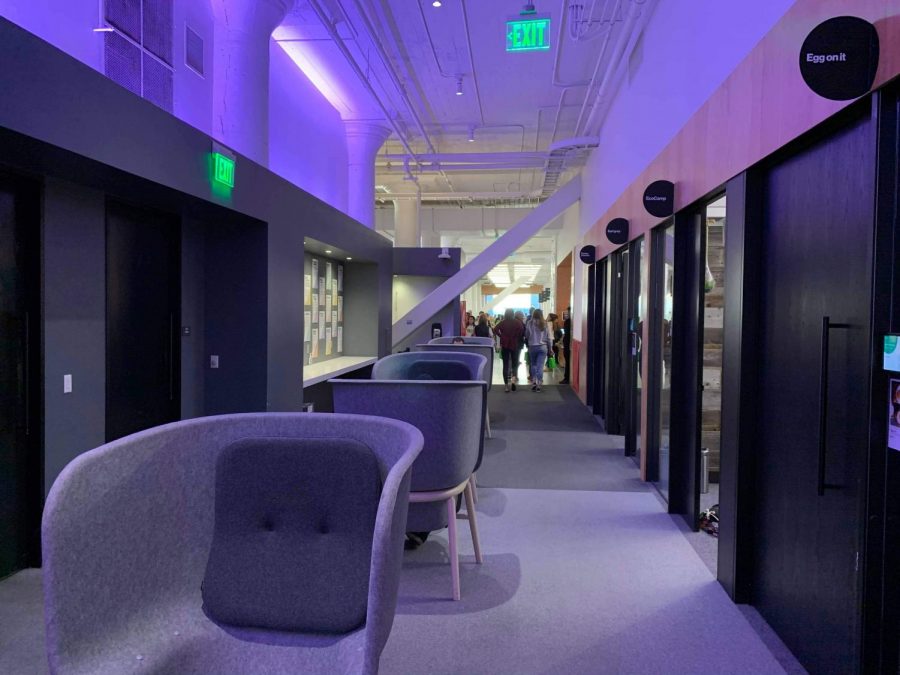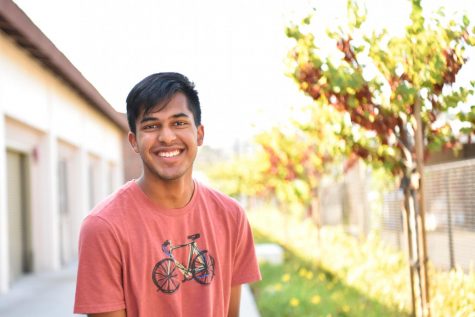Bring Change to Mind’s 2019 California Summit
Bring Change to Mind attends a conference about spreading mental health awareness and personal wellbeing
December 12, 2019
On Nov. 2 at 11 a.m., a multitude of high school students from Northern California stepped into the Pinterest Headquarters in San Francisco. They were welcomed by a greeting party and received compostable positivity cards accompanied by an array of snacks for the day. Among these students were representatives from the MVHS Bring Change to Mind Club (BC2M).
The annual BC2M Northern California regional summit is hosted by the national wellness organization, Bring Change to Mind. With multiple high school branches, the organization teaches student wellness techniques to spread positivity and mental health awareness around campuses.
The summits featured speaker, Jen Gotch, is the founder of the wellness brand Ban.do. Through Ban.do, Gotch aims to produce product lines focused on increasing anxiety awareness through pieces with uplifting messages on them. She is also the author of a book titled, “The Upside to Being Down,” which details her struggles with anxiety, bipolar disorder and behavioral therapy. Gotch discussed being misdiagnosed with depression in her youth before being diagnosed with depression at the age of 23, in addition to her current experiences with therapy as an entrepreneur.
“[Gotch] had a really good sense of humor about [her therapy] and [her speech] was very engaging,” student advocate and BC2M advisor Richard Prinz said. “To me, [her speech] was very heartening … [Gotch] modeled being vulnerable and talking opening about [mental health].”
After Gotch’s speech, the students participated in group discussions with students from other high schools across the Bay Area. BC2M meeting coordinator and senior Sravya Gonaguntla explained how she discovered an idea from another school at a previous summit — positivity post-it notes. She found it inspiring and worked with the officer team to implement putting positive post it notes in the bathrooms at MVHS.
They put into place the post-it note idea in the following year of 2018 after the summit. Officer of public relations and junior Yolanna Lu believes that the positivity post-its had a subtle yet beneficial impact among the student body.
“It was a really cool [and] casual thing to come across — if you are having a bad day, and you just see a post-it on a window, [it can] just lift your mood,” Lu said. “Even though it’s seemingly very trivial, it can do a lot to help someone.”
In addition to providing new ideas, the sense of community at the summit is beneficial for students, according to Prinz. Seeing a collection of people can build solidarity and a sense of purpose, according to Head to Health Initiative.
“It was really inspiring to see so many people that are interested in coming out [to the summit],” Prinz said. “Because I think [the summit] is about coming out with struggling with things and having issues. And [that] mental health is okay to talk about.”
“It was really inspiring to see so many people that are interested in coming out [to the summit]. Because I think [the summit] is about coming out with struggling with things and having issues. And [that] mental health is okay to talk about.”
— Richard Prinz
President and senior Daniel Duan agrees that the summit allows students to bond and connect with similar-minded peers. He adds that the summit is a platform for students to reveal their experiences with anxiety and mental health, build community and learn about one’s own health.
“I’m hoping that [the summit is] just another medium for them to talk about some of the problems that they’re not as comfortable talking about,” Duan said. “And then also just another way for them to learn through participation and the various activities that you can do for mental health.”
The summit hosted workshops and encouraged student to student event brainstorming. Ultimately, it provided an opportunity for students to share and discuss mental health and built a safe regional community for students.
“Students had a chance to talk,” Prinz said. “One of the [benefits] is just seeing the number of people that are actively trying to do something about this. That gives everybody’s support. You don’t feel so alone in this project.”

















